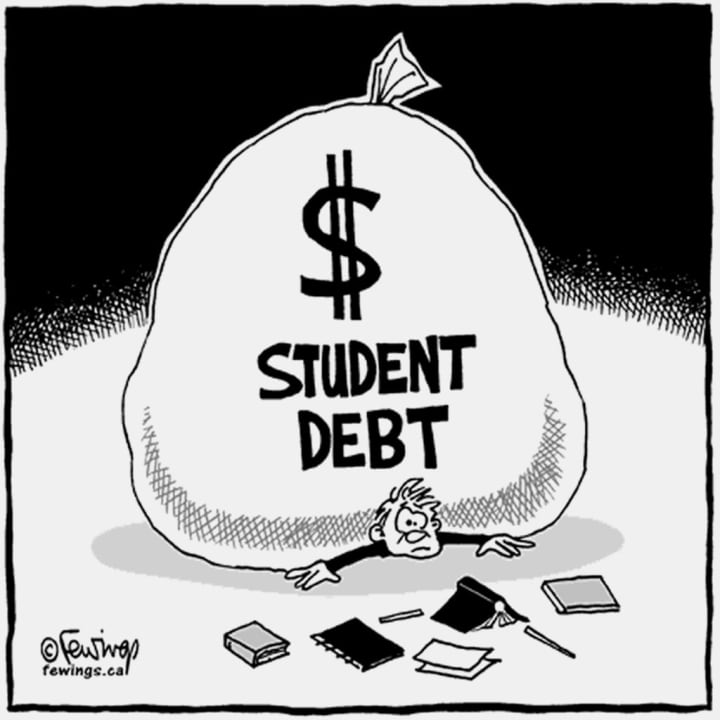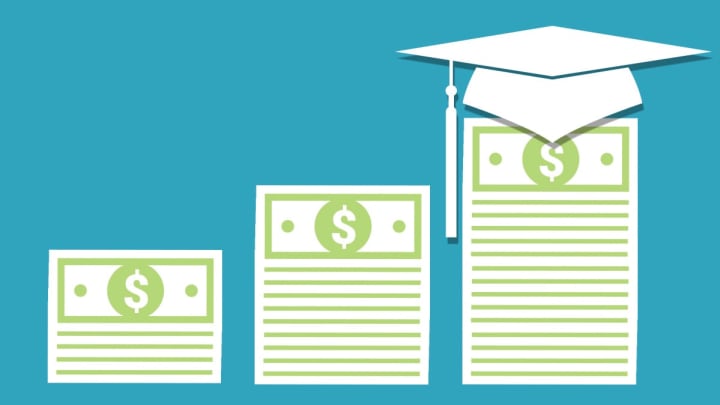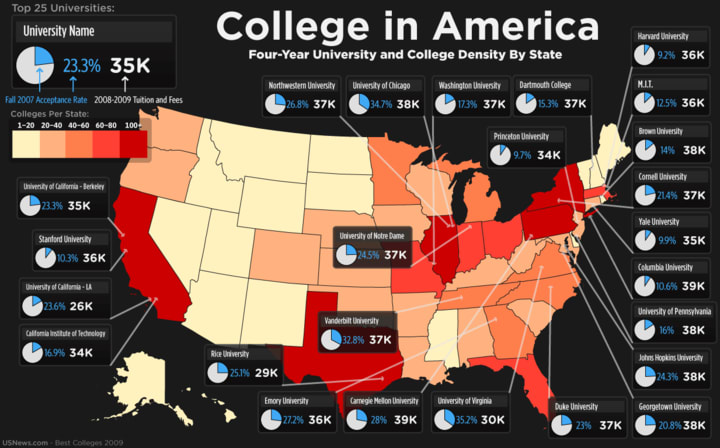Why Is School so Expensive?
After looking at the current cost of in-state tuition, one intrepid writer decides to find out why is school so expensive.

It was a total of $15,000 a year.
$15,000 dollars for a single year of college tuition and fees. At a public university in my home state. I wanted to go back to school to finish the degree I was going to get, but the price alone made me reconsider.
That price tag was ridiculously steep, especially for an arts degree that would have honestly not gotten me that much better of a job. For $15,000, I could have bought a new car, gotten needed surgery, or even paid for a year of rent.
This just doesn't make sense to me. Why is school so expensive, when it's known that being educated tends to bode well for a country's wellbeing? I felt cheated by the American school system. Here's what I discovered when I started digging into this mess.
First off, no, it's not just you; the price of school here is outrageous.

According to a study cited by The Atlantic, going to an American college will cost around $30,000 on average. This price tag is paid by taxpayers and students alike. This is approximately double the amount of money that any other country will spend on schooling.
With a higher price tag than any other country, you'd expect us to have an amazing educational system. This isn't true, though. Andrew Schriber, who was quoted in the article, noted, "Spending per student is exorbitant, and it has virtually no relationship to the value that students could possibly get in exchange."
To make matters worse, student loan debt is unforgivable by US bankruptcy law. So, even you're bankrupt, you still have to pay off those loans.
Room and board does cover some fault for making school so expensive.
We spend about three times the average amount of a normal country when it comes to room, board, and food. However, The Atlantic's article points out that those expenses only contribute around $3,000 or so to the price tag.
That leaves about $27,000 unaccounted-for. Yikes. Even though amenities like counseling and mental health services are starting to become more widespread on campus, that still doesn't make up for the huge price tag. With that much money, it leaves most graduates sadly singing the unrelenting student loan soliloquy.
The biggest issue that affected college tuition rates is the spike in college enrollment interest.
It's no secret that college is more popular than ever before—much thanks to Baby Boomers who told us that a degree is the only thing we need in order to succeed. (I'm not bitter, I swear.)
The more people started to drum the idea of "degree = happiness" into kids my age, the more kids started to see college as the only way to make a living. Like with any other item in our capitalist society, college is a supply-and-demand issue. But is the cost of college worth it?
The supply stayed relatively stable over the years, but the demand skyrocketed. As a result, the prices started to increase because people became more willing to pay to get into any college.
The biggest reason for college tuition increases deals with the need to pay professors and administrators.

Speaking as a child of two college professors, I can tell you with a lot of confidence that American college standards are getting stricter than ever before. In most schools, professors are tracked by rating, have to get their curriculum approved by committees, and also have to answer to a wide range of administrators.
The increase in lawsuits and scandals that broke out around college campuses hasn't helped. Because America is a very litigious country, both public and private colleges have started to cover their tracks. To do this, they need more administrators to prevent being sued out of oblivion.
More red tape continues to be tacked on every year. With that red tape comes more admins needed. Moreover, professors aren't exactly cheap to hire. They have to have advanced degrees too.
Capitalism started to force peoples' hands, too.
If you want to know the answer to "why is college so expensive?" take a look at what capitalism's done to the market. There was a time not too long ago that both college-educated people and those without a degree had living wages.
Jobs that didn't require a degree were plentiful and paid enough to match the cost of living. These days, the cost of living has skyrocketed. The number of jobs that don't require a degree diminished, primarily because employers started seeing them as mandatory for basic skills.
Jobs that require degrees are less likely to have low pay, and in many cases, actually have salaries that match the market. Employment rates also show that having a degree will prevent you from going jobless.
These days, if you want to buy a ticket to the middle class, you often do need a degree. Knowing this, many schools started charging more.
It's not only the schools that charge more.

If the student loans you grabbed from Navient weren't already going to pay for a ton of bloated prices, don't worry. The textbook industry will make sure you pay out the ass for your knowledge.
Students will tell you that the price of textbooks became insane. To make matters worse, publishers are now making textbooks useless without special codes that can't be passed down. This is nothing short of price-gouging by companies that know students will pay anything to pass. When you're a freshman lost in the college daze, surviving your first semester is hard enough, it feels impossible to compromise on getting "required" textbooks.
A typical textbook can cost hundreds of dollars. If you're a med student, you might see prices as high as $1,400 a semester. That's more than the $981 people paid in rent for a month, on average, across the country.
Textbook companies don't care, nor should they. Their goal is to make money and they are accomplishing that well—even though it's hurting students immensely. Unless we start cracking down on publishers in the textbook industry, this will not change.
States stopped funding colleges the way they used to.
A lot of people don't know this, but both private and public schools get federal funding. Why is college so expensive, then? Well, federal and state funding for education has dropped significantly over the years.
As budget cuts continued to make it hard for schools to make ends meet, colleges started to look towards tuition increases to make up for the difference. Some are even going for out-of-state enrollees just because they will pay more.
And sadly, there are no quick ways to pay back your student loans without making some serious sacrifices.
Certain schools have also gotten into the business of price-gouging students.
For-profit schools are a thing, and they are known to be remarkably predatory. Often aiming to enroll as many low-income people as humanly possible, these schools will go out of their way to get them to pay a premium price on an education that doesn't really benefit them very much.
One needs not to ask why school is so expensive at these institutions; they are made to make money off you. Their guarantee of employment doesn't really hold water, they just offer a chance to say you're a grad. That's actually why some colleges got shut down. Even so, while for-profit schools are costly, state tuition isn't exactly a bargain either.
So... why is school so expensive in the United States?

If you couldn't guess from my writing, the answer became very clear. School is expensive because we let it be expensive. We stopped caring about the greater good, stopped funding schools, and now refuse to put our collective feet down.
Rather than say "Enough is enough!" and refuse to play the game set before us, we sigh and bend over. Personally, I don't believe college is worth it anymore. I don't want to be a slave to student loans. College is not for everyone and it's not for me.
About the Creator
Cato Conroy
Cato Conroy is a Manhattan-based writer who yearns for a better world. He loves to write about politics, news reports, and interesting innovations that will impact the way we live.
Enjoyed the story? Support the Creator.
Subscribe for free to receive all their stories in your feed. You could also pledge your support or give them a one-off tip, letting them know you appreciate their work.






Comments (1)
In fact, many factors can indeed be explained. The production of textbooks involves various expenses, including author royalties, research costs, editing, design, printing, and distribution. These costs contribute to the overall price of the textbook. Just recently I read an interesting article on this topic here https://bookscouter.com/blog/why-are-textbooks-so-expensive/